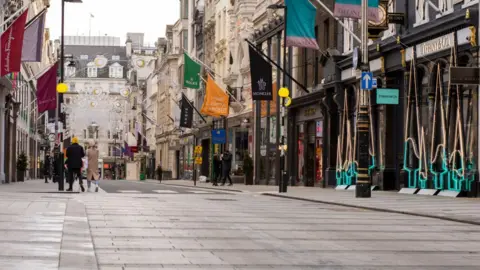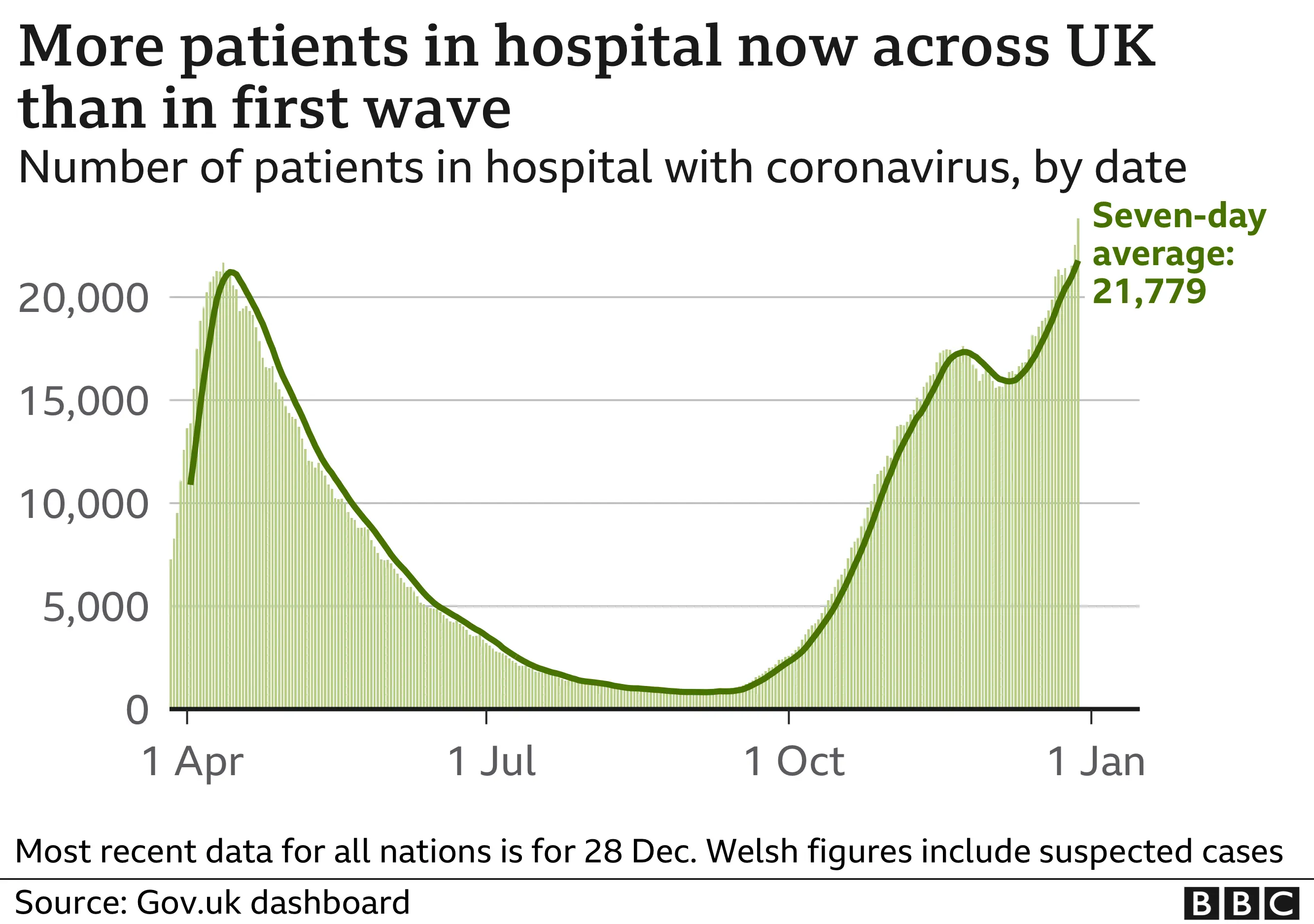Covid: Boris Johnson set to announce new England lockdown
 Getty Images
Getty ImagesBoris Johnson is expected to announce a set of new national restrictions for England, similar to the March lockdown, in a televised address at 20:00 GMT.
The PM is likely to urge the public to follow the new rules from midnight.
It is expected people will be told to work from home if possible and schools will close for most pupils.
It is not yet clear when the measures will be reviewed, but MPs are likely to be given a vote to approve them retrospectively on Wednesday.
Meanwhile, the UK's chief medical officers warned of a "material risk of healthcare services being overwhelmed" in several areas over the next 21 days.
Scotland announced a legal requirement to stay at home from midnight, with schools to be closed.
Mr Johnson will set out plans for England as the UK's devolved nations have the power to set their own coronavirus regulations.
Both Wales and Northern Ireland are already under national restrictions.
On Monday, the UK recorded more than 50,000 new confirmed Covid cases for the seventh day in a row.
As of 08:00 GMT, there were 26,626 Covid-19 patients in hospital in England, according to the latest figures.
This is a week-on-week increase of 30%, and a new record high.
Mr Johnson is expected to tell people to work from home unless they are a key worker, or it is not possible for them to do so, for example if they work on a construction site, according to BBC political editor Laura Kuenssberg.
It is also understood that England's chief medical officer, Prof Chris Whitty, has told the prime minister the new variant of coronavirus is now spreading throughout the country.
The new variant - first identified in Kent and since seen across the UK and other parts of the world - has been found to spread much more easily than earlier variants.
A No 10 spokesman said the spread of the new variant had led to "rapidly escalating case numbers across the country".
"The prime minister is clear that further steps must now be taken to arrest this rise and to protect the NHS and save lives," he added.


Labour leader Sir Keir Starmer - who called for a national lockdown in England within 24 hours on Sunday - said: "I hope the prime minister has been listening to the clear calls for tough national restrictions."
Hospitals have said they are under "extreme pressure" and one of Britain's most senior doctors warned on the weekend that trusts across the UK should prepare themselves for a surge in cases.
The number of Covid-19 patients in UK hospitals is currently above the level seen in spring 2020.
A further 58,784 cases and an additional 407 deaths within 28 days of a positive test result were reported on Monday, though deaths in Scotland were not recorded.

Race between virus and vaccine

What worked before may not work again - even a repeat of the March lockdown may not be enough to contain the new variant.
Consider the R number - the number of people each infected person passes the virus onto on average.
The March lockdown brought R down to 0.6 and led to a sharp decline in cases.
Every 100 infected people passed the virus onto 60 others, who passed it onto 36, then 21, then 12 and so on.
But the new variant is thought to be around 50% more transmissible so its R number, in the same lockdown conditions, would be around 0.9.
Then 100 infected people would pass the virus onto 90 others, then 81, then 73, then 66 and so on.
This is a far slower decline.
However, uncertainty around the new variant means there are scenarios where its levels plateau rather than fall during lockdown conditions.
It is going to be a tough start to the year. Even with immediate and tough restrictions there are a projected 20,000 additional deaths in the first months of 2021.
Now more than ever this is a race between the virus and the vaccine.

Mr Johnson's address comes as UK chief medical officers recommended the Covid threat level be increased to five - its highest level.
It means the NHS may soon be unable to handle a further sustained rise in cases, the medical officers said in a joint statement.
NHS Providers, which represents health service trusts, said hospitals were at a "critical point" and that "immediate and decisive action" is needed.


Previously, the government described level five as requiring stricter social distancing measures. The first lockdown, which began in March 2020, was when the UK was under level four.
These Covid threat levels are separate to the regional tier system of restrictions in England.

- SCHOOLS: What will happen if children catch coronavirus?
- TESTING: How do I get a virus test?
- JOBS: How will I be kept safe at work?
- THE R NUMBER: What it means and why it matters

Announcing tougher measures in Scotland, First Minister Nicola Sturgeon said: "It is no exaggeration to say that I am more concerned about the situation we face now than I have been at any time since March last year."
The new restrictions in Scotland mean it will be a legal requirement to stay at home except for certain essential purposes, similar to the first lockdown last March. Schools will be closed to pupils until February.
In Wales, all schools and colleges will move to online learning until at least 18 January.
Northern Ireland's Stormont Executive are also meeting to discuss possible new measures in light of Mr Johnson's televised address - which will air on BBC One and the BBC iPlayer from 19:35 GMT.
The prime minister will speak amid continued uncertainty over whether schools will remain open to all pupils in England, after several councils requested classrooms stay shut.
Earlier on Monday, an 82-year-old retired maintenance manager became the first person in the UK to receive the Oxford-AstraZeneca Covid-19 vaccine.
Brian Pinker said he was "really proud" to receive a jab developed in the UK, which will form a large part of the country's mass vaccination plan.
"The nurses, doctors and staff today have all been brilliant and I can now really look forward to celebrating my 48th wedding anniversary with my wife Shirley later this year," Mr Pinker said.
